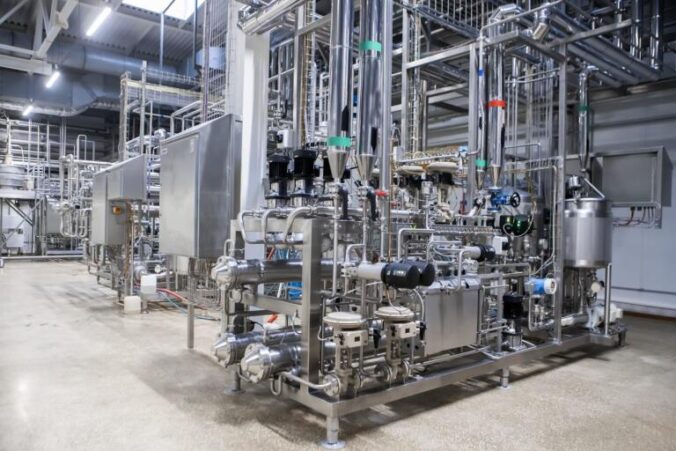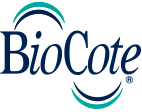In this blog, market-leading antimicrobial additives provider BioCote® shares the benefits of integrating antimicrobial technology into food manufacturing surfaces.
The food and drink industry is fast-paced and constantly evolving to keep up with consumer demands. Regulations have expanded in recent years to account for our increasingly globalised supply chains and demand for high-quality goods.
It is therefore becoming increasingly important to make the cleanliness of food manufacturing products a high priority. By integrating BioCote® built-in antimicrobial technology into food manufacturing surfaces, those surfaces will be protected from odour, staining and material degradation causing microbes.
Supporting stringent hygiene principles
Within the food and drink industry, both hygienic design and choice of equipment materials are key factors in preventing the accumulation of microbes that cause odours, staining and material degradation. BioCote® has been an advocate for better hygiene for over 25 years. Our additives work alongside regular and robust cleaning regimes to produce the ultimate hygienic solution. Our technology, built into key surfaces via our customer’s products, actively reduces the number of microbes on a protected surface. It works in-between cleans to control the levels of microbes on those surfaces, working constantly and lasting for the expected lifetime of that product. Fewer microbes on the surface mean less odours, less staining and reduced material degradation. For some products, this will mean extending their usable lifetime past that of an unprotected product, creating additional sustainability within that product range.
The science behind antimicrobial technology
The term ‘antimicrobial’ is used to describe a substance that reduces the presence of microbes. As an antimicrobial solutions provider, the kind of antimicrobials that BioCote® supply to market can also be referred to as additives, active substances or biocides. Once manufactured appropriately into materials such as plastics, paints, coatings and textiles, our technology gives products antimicrobial protection that works around the clock to reduce microbes for the surface.
Introduced during the manufacturing process, BioCote® antimicrobial additives will negatively impact odour causing, staining and material degrading microbes that can affect the product. The additives reduce microbes on protected surfaces in a number of ways:
- Damage is inflicted on the microbe’s protein components, which causes the failure of essential functions such as energy production.
- By disrupting the microbe’s membrane, its structural integrity is compromised, which can cause essential nutrients to leak out and catastrophic structural failure.
- Antimicrobials can cause increased levels of reactive oxygen species, which result in damage to the internal systems of the microbe.
- The genetic material of the microbe is disrupted, ultimately stopping the microbe from being able to replicate by blocking the copying of their genetic material.
Once manufactured into the material, BioCote® antimicrobial protection is permanent and provides built-in protection for the useable lifetime of your product beyond that of an unprotected one, creating additional sustainability within that product range.
Unique accreditation for food safety
BioCote® is the world’s only HACCP International certified antimicrobial additive supplier, making our technology safe for manufacture into food contact surfaces.
HACCP International is a leading food science organisation, specialising in the HACCP food safety methodology and its application within food and related industries. HACCP International operates a world-renowned product certification scheme for food-safe equipment, materials and services. The scheme confirms a product’s suitability for use within food businesses that operate to the world’s highest standards. The certification is of great benefit to companies that supply products and services to the food and catering sector, where food-safety compliance is a necessity.
BioCote® is continuously committed to quality control, which means we are part of a vast network of successful organisations that supply products endorsed by HACCP International. To achieve this certification, HACCP International’s impartial and experienced food technologists have rigorously assessed and verified the stringent BioCote® quality control procedures. By meeting the ten key criteria stipulated by HACCP International, the antimicrobial technology BioCote® supplies has been formally verified as ‘fit for purpose’ and safe for manufacture into food contact surfaces.
Meaningful antimicrobial product applications for the food industry
With a broad portfolio of different additives available, BioCote® antimicrobial technology can be incorporated into a wide range of surfaces or products ideal for use in food-related environments. Only products achieving superior antimicrobial performance carry our trademark; BioCote® treated materials reduce up to 86% of microbes in 15 minutes and up to 99.99% in a 24-hour period, as proven by scientific tests and results.
Our partner Unigloves offer the first-ever rubber nitrile gloves with built-in BioCote® antimicrobial protection. Ionic silver particles are impregnated throughout the rubber nitrile during glove production, giving them inherent antimicrobial properties to protect the gloves from microbes. They maintain their antimicrobial protection for the lifetime of the glove, controlling odour, staining, and material degrading microbes to protect the glove. Using antimicrobial rubber nitrile gloves also provides an added layer of protection against hazards in the food processing environment, such as skin irritations from contact with food chemicals, moisture, and harsh cleaning supplies. This is of particular importance when considering that the most common industrial injuries are those on the hands and fingers, as outlined in a recent HACCP International whitepaper.
BioCote® partners Monika have designed a complete safety, hygiene and compliance management system, which can monitor temperature using mobile technology. It is suitable for use in a wide variety of industries, including, but not limited to: food processing, food retail, hotels and restaurants, and pubs and bars. Their MonikaPrime handheld PA uses pre-configured software to automate tasks and procedures, dramatically reducing the amount of staff time spent on manual food safety or temperature checks. It also offers uninterrupted data management and easy monitoring of an entire organisation from any PC of their smart PA. The wireless, mobile technology is well suited for use in larger organisations, and by multiple users. BioCote® technology gives the MonikaPrime both antimicrobial protection and HACCP International compliance. The PA is designed to withstand the rigours of harsh environments such as kitchens and laboratories and uses versatile temperature monitoring technology that can protect even the most sensitive products, such as vaccines.
Comark are similarly experts in temperature and provide various products and monitoring solutions to the food industry. They have added BioCote® antimicrobial protection to their top-selling temperature measurement instruments as a means of improving hygiene for their products and staying true to their vision of delivering trusted and innovative temperature solutions. These instruments can be used to check and monitor safe temperatures for food and other temperature-sensitive materials throughout the manufacturing and supply chain. Their products are also compliant with HACCP regulations; Comark has even introduced its Pocketherm Food Thermometer in HACCP colours as a representation of their due diligence and health and safety procedures.
ABB are another pioneering technology leader that has been at the forefront of creating digitally connected industrial equipment and systems for over four decades. With a rich history in food and beverage, ABB understands how demanding the industry can be and how any downtime to manufacturing can prove costly. Therefore, they have created cable management products that continue to deliver performance in areas where ingress protection, as well as resistance to oils and chemicals, is paramount. Like BioCote®, ABB shares the belief in offering product protection from within and has created a wide range of secure, liquid-tight systems that protect critical writing under testing conditions. Their latest product, Adaptaflex, uses BioCote® technology to provide antimicrobial solutions that are suitable for all food zone areas and processing equipment. The flexible conduit system combines innovative design with dedicated manufacture and offers resilient antimicrobial protection for crucial power and data cables within. The antimicrobial technology will not wear off or wash away and survives the lifetime of the product, even when tested to withstand constant vibrations, water ingress, high temperatures, or freezing sub-zero conditions.
Flooring is also one of the biggest surface areas within the food industry that is exposed to extreme conditions, from abrasion, thermal and chemical attack. John Lord has been manufacturing and installing resin flooring for the food and drink sector for over 100 years, and like ABB, they understand the specific requirements and demands of the industry. John Lord understands that it is crucial to maintain high levels of cleanliness at all times, and they have created a wide range of flooring that is built on the premise of offering excellent hygiene standards for their products. Their BioCote® incorporated resin flooring works 24/7 to disrupt the function of microbes, rendering them unable to replicate and survive. The antimicrobial technology reduces odour, staining, and material degradation causing microbes by up to 99.99% and is included in their flooring systems during the manufacturing process. It is present throughout the entire thickness of the resin floor and is created to suit a variety of extreme conditions and substrates. John Lord manufactures and installs a wide range of Polyurethane, Epoxy and Acrylic resin flooring systems, and our BioCote® technology can be added to any of them.
Component Design Northwest (CDN) is at the forefront of innovation when it comes to inventing state-of-the-art solutions for any temperature measuring task. The company was founded in 1984. At the heart of their business lies the aspiration to explore the science of cooking and to improve kitchen measurement tools through experimentation and creativity. As a global category leader, they take the necessary extra steps to ensure that quality, durability and accuracy are met. Their thermometers have been specifically designed for the fast-paced environment of the foodservice industry and come equipped with a 1.5 mm thin tip technology, field calibration, rapid response and temperature memory, all permeated with BioCote® silver ion technology. They use 304-grade stainless steel, which is superior to the stainless steel used by many of their competitors in the food industry. Many of CDN’s thermometers are also NSF® Certified, representing a symbol of trust that is recognised and respected by chefs, manufacturers, foodservice and regulatory agencies at local, state, federal and international levels. The vast majority of their products can be privately labelled, and they also develop custom thermometers can be based around the personal, specific needs of each individual customer.
How BioCote® can support you
BioCote® antimicrobial technology is not designed to replace cleaning but instead, it is there to support it and deliver a second line of defence. As demonstrated, BioCote® antimicrobial technology can be added to an extensive range of applications within the food industry, supporting existing cleaning regimes. Making products more hygienic makes it easier to keep clean from odour, staining, and material degrading microbes.
If you would like to learn more about BioCote®’s antimicrobial technology or are looking to make your products antimicrobial, please visit biocote.com or use the contact details below to get in touch with the company.


